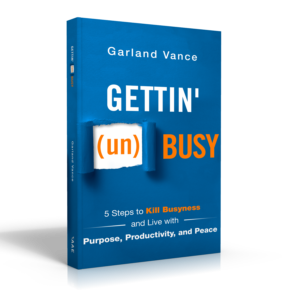Let’s Kill Busyness
Everyone is busy. And it’s killing us all. Hurry is the new normal. When someone asks us how we’re doing, we tell them that we’re “good… but busy.” We want to achieve our dreams and live a significant life, so we cram our calendars with nonstop activities. But instead of feeling fulfilled, we’re distracted, exhausted, and overwhelmed. We have too much to do and not enough time.
Did you know that the World Health Organization recently diagnosed workplace burnout as a medical condition? It’s characterized by feelings of energy depletion, increased mental distance from one’s job and reduced professional efficacy.
In the new book Gettin’ (un)Busy: 5 Steps to Kill Busyness and Live with Purpose, Productivity, and Peace, Garland Vance uncovers the lies that keep us trapped in overcommitted lives and how we can stress less, accomplish more, and start enjoying our lives.
An Important Wake Up Call
You open the book talking about what many of us have experienced: an incredibly overstuffed life, leading to medical issues. I love that you share your internal voice when you were told you were stressed. “Stress is something incompetent people have. Stress is for those who aren’t smart enough to manage their time.” Talk about that wake-up call and how it led to this book.
In 2013, I went to see my doctor because I was experiencing significant medical problems including having three debilitating migraines each week. When the doctor asked me to describe my life, I told him about my leading one of Chick-fil-A’s nonprofits, fifty-hour workweeks, doctoral classes, having three young kids, and volunteering at church. I told him that I was busy—just like everyone else.
He diagnosed me with stress due to my busyness.
I got upset with him because I was great at time management. I had read hundreds of books and article on it and was even training others in time management.
Since I was working on my doctorate in leadership, I started researching busyness and its effects on leaders. I realized all the damage that it was doing to us—to me—physically, mentally, emotionally, and relationally.
Perpetual Overcommitment
Why do we honor busyness and wear it as a badge of honor?
Busyness is an overcommitment to too many good commitments. All of the obligations in our lives are good: work, family, side hustles, community involvement, kids’ activities, etc. We’re proud of all those good commitments because they make us feel significant. Tim Kreider wrote, “Busyness serves as a kind of existential reassurance, a hedge against emptiness. Obviously, your life cannot possibly be silly or trivial or meaningless if you are so busy, completely booked, in demand every hour of the day.” We wear busyness like a badge of honor because it makes us feel important.
3 Inhibiting Beliefs
Talk a little about the inhibiting beliefs that keep us overly busy.
Busyness isn’t merely a calendar issue. It’s rooted in beliefs we have about ourselves. I found three Inhibiting Beliefs that keep us trapped in busyness:
- Identity – I need to BE more.
- Activity – I need to DO more.
- Quantity – I need to GET more.
The most dangerous Inhibiting Belief is that I need to BE more. It’s especially dangerous for leaders and high achievers because of our tendency to push ourselves to be the best we can be.
Every time we want to “upgrade” ourselves, we start comparing the current version of ourselves with the future version we want. We determine that, in our current version, we aren’t enough. We convince ourselves that we are fundamentally flawed. To fix these flaws, we need to “do something,” so we add more obligations to our already overcommitted lives.
5 Steps to Getting (un)Busy
You share five steps of Getting (un)Busy. They are simple and powerful. The first is decide. I think that’s important because many don’t really want to get out of the cycle, do they?
No, they don’t. Many people complain about how exhausted they are but don’t want to do anything about it. Busyness causes stress, and stress is like a drug: it feels good even though it causes damage. Whenever we experience stress, our bodies release adrenaline and cortisol (those give you energy). When we accomplish something, it releases dopamine (which makes you feel happy). Unfortunately, long term exposure to adrenaline and cortisol wreak havoc on our bodies, minds, emotions, relationships, and even our productivity.
Perhaps surprisingly you have deconstruct as the next step. Share a little more about this and why it’s so important.
When I first started researching and implementing a process to get (un)busy, I thought that people would decide to beat busyness and then jump immediately into designing the life they want to live. But I discovered that this led people to add more commitments to an already overcommitted life. It was like telling a hoarder that the best way to clean out his house was to start envisioning all the stuff he could collect!
Before you can envision the life you want to live, you have to deconstruct Inhibiting Beliefs, Bad Habits, and (un)Wanted Commitments from your life.
What do most people get wrong in the design phase?
I see two common mistakes in the Design phase. First, people make a mistake when they jump straight from Decide (step 1) to Design (step 3). They skip the deconstruction of the Inhibiting Beliefs, Bad Habits, and (un)Wanted Commitments. They end up adding more commitments to an already overcommitted life.
Second, they often jump straight into designing their lives around their dreams and priorities. Dreams and goals will fuel you, but they can also consume and eventually exhaust you. The most Purposeful, Productive and Peaceful people first design their lives around Relationships, Recreation, Rest, and Reflection. I call these practices the Core 4 because you build these four pillars into your schedule before you schedule anything else.
Develop is where it really starts, but the former habits can take over. How do you guard against this?
One of the best ways to guard against slipping back into busyness is to take proactive control of your calendar. There are three best practices for doing this:
- Use time blocking. Specifically, you want to block time for your priorities and for your Core 4 (Relationships, Recreation, Rest, and Reflection).
- Manage your margin. Start building space into your schedule so that you have time for interruptions, emergencies, and surprises.
- Stop one day every week. By taking one day off every week from all forms of work, you’ll see both your rest and your productivity skyrocket. And you’ll guard against falling back into busyness.
Build Morning Habits
Talk about building morning habits and their importance.![]()
The first fifteen minutes of your day affects the next fifteen hours. Most people start their days with hurry, worry, and scurry. Even people who have a morning routine often start their mornings focused on productivity.
I encourage people to start their days with a few peaceful activities. It could be sipping a cup of coffee, sitting on your back porch, reading from a favorite book, or doing some deep breathing. When you spend a few minutes in peaceful activities, it sets you up for peace the rest of the day.
Draw others in takes others on the journey with you and changes the mindset of your family and others. How do you best convince those around you to join this new way of living?
Drawing others in starts in your home. Draw your family in by intentionally arranging your family’s calendar so that you don’t get trapped in busyness.
For your friends and coworkers, it’s less about convincing them than it is inviting them. Talk about your quest to beat busyness. When they see that you stress less, accomplish more, and enjoy your life, that’s the most convincing argument.
For more information, see Gettin’ (un)Busy: 5 Steps to Kill Busyness and Live with Purpose, Productivity, and Peace.

